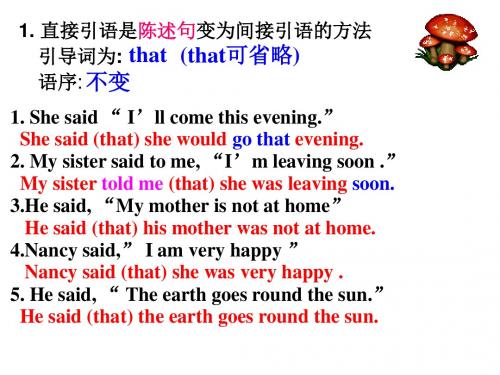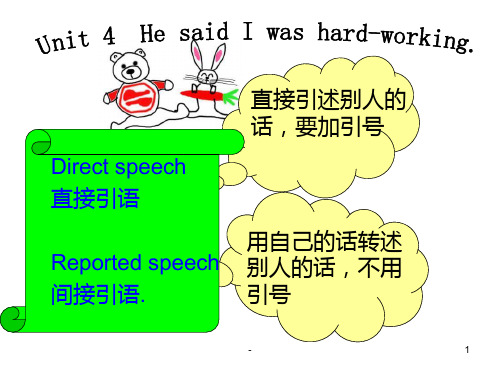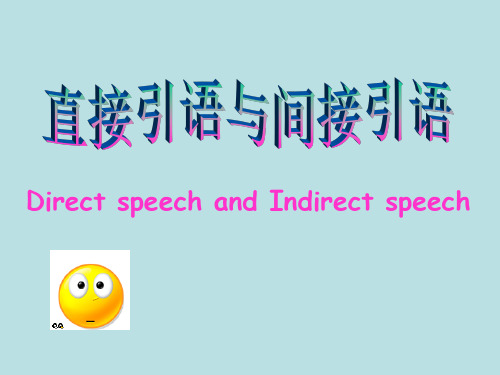直接引语变间接引语讲解课件
合集下载
直接引语和间接引语(19张PPT)初中英语专项复习课件

直接引语变间接引语
一、直接引语&间接引语 – 定义 二、句子结构变化规则 三、语序变化规则 四、人称变化规则 五、时态变化规则 六、指代状动变化规则
一、直接引语 间接引语 -- 定义
直接引语:引用别人的原话; Peter said “ Jack is a Bully!” 间接引语:用自己的话转述别人的话(宾语从句) Peter said that Jack was a Bully.
She said, “ I broke your phone.” She said that she _h_a_d_b_r_o_k_e_n my phone.
现在完成时→ 过去完成时
She said, “ He has gone home.” She said that he __h_a_d_g_o_n_e__ home.
go take have to
六、指代状动变化规则
5变: 指代状动
指示代词 时间状语 地点状语
this→that; these→those
now→then; today→that day; yesterday→the day before last week→the week before; tomorrow→the next day
一般现在时→ 一般过去时
He said, “ I know it.” He said that hek_n_e_w it.
现在进行时→ 过去进行时
He said, “ I am drinking milk.” He said that he _w_a_s_d_r_in_k_i_ng_ milk.
一般过去时→过去完成时
• 4.The teacher said, “The sun is bigger than the moon.”
一、直接引语&间接引语 – 定义 二、句子结构变化规则 三、语序变化规则 四、人称变化规则 五、时态变化规则 六、指代状动变化规则
一、直接引语 间接引语 -- 定义
直接引语:引用别人的原话; Peter said “ Jack is a Bully!” 间接引语:用自己的话转述别人的话(宾语从句) Peter said that Jack was a Bully.
She said, “ I broke your phone.” She said that she _h_a_d_b_r_o_k_e_n my phone.
现在完成时→ 过去完成时
She said, “ He has gone home.” She said that he __h_a_d_g_o_n_e__ home.
go take have to
六、指代状动变化规则
5变: 指代状动
指示代词 时间状语 地点状语
this→that; these→those
now→then; today→that day; yesterday→the day before last week→the week before; tomorrow→the next day
一般现在时→ 一般过去时
He said, “ I know it.” He said that hek_n_e_w it.
现在进行时→ 过去进行时
He said, “ I am drinking milk.” He said that he _w_a_s_d_r_in_k_i_ng_ milk.
一般过去时→过去完成时
• 4.The teacher said, “The sun is bigger than the moon.”
直接引语变间接引语讲解课件

“Areked me
Whether / if I was ready.
“Do you know my name?”
She asked me
是否 Whether / if
I knew her name.
“Can you help me?”
She asked me
“What are you doing?”
She asked me
what
I was doing.
“How does she go to school?”
She asked me
how
She went to school.
“Why do you like English?”
He asked me
1. 直接引语是陈述句变为间接引语的方法 引导词为: that (that可省略) 语序: 不变
1. She said “ I’ll come this evening.” She said (that) she would go that evening. 2. My sister said to me, “I’m leaving soon .” My sister told me (that) she was leaving soon. 3.He said, “My mother is not at home” He said (that) his mother was not at home. 4.Nancy said,” I am very happy ” Nancy said (that) she was very happy . 5. He said, “ The earth goes round the sun.” He said (that) the earth goes round the sun.
直接引语变间接引语(完整)PPT课件

CHENLI
17
二、间接叙述转换为直接叙述
(1)改标点,改逗号为冒号,添加引号。 (2)改人称如果转述内容中是第三人称“他 (她)”或“他(她)们”,应改为“我”或 我(们)”;如果在转换时遇到一个句子中有两个 第一人称“我”时,应改后面的一个“我”为第二 人称“你”。
CHENLI
18
例:姐姐说,她明天送给我一件生日礼物。 改为:姐姐说:“我明天送给你一件生日礼物。
9、老师对王小宁说:“我有事,你组 织同学们继续完成制作。”
10、王明再也忍不住了,抢着对老班长 说:“我帮你一起找,我找得见。”
CHENLI
16
8、老师严厉地对小敏说,他必须把教室打扫干净。
9、老师对王小宁说,他有事,王小宁组织同学们继续 完成制作。
10、李明再也忍不住了,抢着对老班长说,他我帮老班 长一起找,他找得见。
CHENLI
19
1、妈妈问小宁他昨天去了哪里,她找了 他一整天。
妈妈问小宁:“你昨天去了哪里?我找 了你一整天。”
2、小方说,不行,他的字写得不够好, 应该让小宇去参加比赛。
小方说:“不行,我的字写得不够好,
应该让小宇去参加比赛。”CHENLI
20
3、王兰告诉我,我作文比赛得了一等奖。
4、王刚对李明说,他的鞋破了,脚掌也 出血了,他实在走不动,让李明自己先 走吧!
CHENLI
21
3、王兰告诉我,我作文比赛得了一等奖。
王兰告诉我:“你作文比赛得了一等奖。”
4、王刚对李明说,他的鞋破了,脚掌也 出血了,他实在走不动,让李明自己先 走吧!
王刚对李明说:“我的鞋破了,脚掌也
出血了,我实在走不动,你自己先走吧!”
CHENLI
直接引语变间接引语精华版PPT课件

He said, “I want to go swimming now. ”
→ He said he wanted to go swimming then.
地点状语,尤其表示方向性的,
here 变 there
The teacher said ,“ You should come here at 7:00.”
现在进行时
过去进行时
He said, “I'm eating an apple.” → He said that he was eating an apple.
一般将来时
过去将来时
Tom said to me “I’ll go to Shanghai next week” Tom told me that he would go to Shanghai
直接引述别人的 话,要加引号
Direct speech 直接引语
用自己的话转述
Reported speech 别人的话,不用
间接引语.
引号
-
1
直接引语变间接引语,即变为宾语从句主要需要 注意以下五点: 1.宾语从句必须用陈述语序。 2.主句时态决定从句时态:如果主句为一般现在时, 从句可以用任何时态(原题给的啥时态就用啥时态); 如果主句为一般过去式,从句必须要用所给时态的 对应的过去式。 3.引导词。 4.人称的转换。 5.时间状语的转换。
C. whether he'll come D. if he comes 2. Could you tell me ___D______ the nearest hospital is?
A. what B. how C. whether D. where
3. Tom asked my friend ____D____.
直接引语与间接引语最全课件

主句为过去的某种时态,直接引语变为间接引语时, 时态要发生变化
Nina told me,“Lisa is studying abroad.” → Nina told me that Lisa was studying abroad. Nell said,“I have worked out this problem.” → Nell said (that) she had worked out that
一般现在时 一般将来时 一般过去时 现在进行时 现在完成时 过去完成时 现在完成进行时
can may must
间接引语 一般过去时 过去将来时 过去完成时 过去进行时 过去完成时 过去完成时 过去完成进行时
could might must/had to
Practice
二.人称的变化
• 直接引语中的人称代词转化为间接引语时变化原 则:一随主,二随宾,第三人称不更新。
• They told Mary,“We will help you out of trouble.” • They told Mary that they will help her out of trouble.
一.句式的变化
• 1. 直接引语为陈述句 • 变为间接引语时,变成由that引导的宾语从
句(that可以省略),同时人称、时态、时 间状语、地点状语作相应变化。
• 引述动词:say、tell等 • “I’ll telephone him this evening,”she said to
me.
• →She told me that she would telephone him that evening.
5. She asked me, "When do they have their dinner?"
Nina told me,“Lisa is studying abroad.” → Nina told me that Lisa was studying abroad. Nell said,“I have worked out this problem.” → Nell said (that) she had worked out that
一般现在时 一般将来时 一般过去时 现在进行时 现在完成时 过去完成时 现在完成进行时
can may must
间接引语 一般过去时 过去将来时 过去完成时 过去进行时 过去完成时 过去完成时 过去完成进行时
could might must/had to
Practice
二.人称的变化
• 直接引语中的人称代词转化为间接引语时变化原 则:一随主,二随宾,第三人称不更新。
• They told Mary,“We will help you out of trouble.” • They told Mary that they will help her out of trouble.
一.句式的变化
• 1. 直接引语为陈述句 • 变为间接引语时,变成由that引导的宾语从
句(that可以省略),同时人称、时态、时 间状语、地点状语作相应变化。
• 引述动词:say、tell等 • “I’ll telephone him this evening,”she said to
me.
• →She told me that she would telephone him that evening.
5. She asked me, "When do they have their dinner?"
高一英语直接引语与间接引语知识精讲PPT课件.ppt

❖ (二)转换方法: ❖ A. 直接引语是陈述句时,改成间接引语要作人称、
时态、时间状语、地点状语、指示代词、动词、呼 语等方面的变化。 ❖ 1. 人称的变化,包括人称代词、物主代词、反身代 词等。
❖ He said , “ I’ve left my book in your room . ” ❖ 他说:“我把我的书落在了你的房间。”
❖ (1)They said , “ we are having an exam now . ” 他们说, “我们正在考试。”
❖ They said that they were having an exam then . 他们说 那时他们正在考试。
❖ (2)John told me , “ About 5,000 people went to the concert yesterday . ”
❖ ▲ 没有间接宾语的,可以加一个间接宾语。 如me,him等。
❖▲ 从句用陈述语序。 ❖eg .(1)He said , “ Do you
understand ? ” ❖他问,“你理解吗?”
❖ He asked me if / whether I understood .
❖他问我是否我理解了。
❖ (2)He asked me , “ Which part of China impresses you most ? ”
❖ (3)tonight→that night (4)this week→that week
❖ (5)yesterday→the day before (6)yesterday evening→the evening before
❖ (7)last week→the week before (8)three days ago→three days before
时态、时间状语、地点状语、指示代词、动词、呼 语等方面的变化。 ❖ 1. 人称的变化,包括人称代词、物主代词、反身代 词等。
❖ He said , “ I’ve left my book in your room . ” ❖ 他说:“我把我的书落在了你的房间。”
❖ (1)They said , “ we are having an exam now . ” 他们说, “我们正在考试。”
❖ They said that they were having an exam then . 他们说 那时他们正在考试。
❖ (2)John told me , “ About 5,000 people went to the concert yesterday . ”
❖ ▲ 没有间接宾语的,可以加一个间接宾语。 如me,him等。
❖▲ 从句用陈述语序。 ❖eg .(1)He said , “ Do you
understand ? ” ❖他问,“你理解吗?”
❖ He asked me if / whether I understood .
❖他问我是否我理解了。
❖ (2)He asked me , “ Which part of China impresses you most ? ”
❖ (3)tonight→that night (4)this week→that week
❖ (5)yesterday→the day before (6)yesterday evening→the evening before
❖ (7)last week→the week before (8)three days ago→three days before
直接引语变间接引语讲解课件

转换的基本原则
准确转述
用自己的语言准确转述 说话人的意思,不改变
原意。
调整时态
根据上下文语境,调整 时态以符合整体语境。
调整人称
根据需要,将直接引语 中的第一人称或第二人
称转换为第三人称。
去除无关细节
去除直接引语中与主要 信息无关的细节,使转
述更加简洁明了。
02
CATALOGUE
直接引语变间接引语的步骤
标点符号的转换
01
直接引语中的冒号和双引号需转 换为间接引语中的逗号和单引号 。
02
例如:“I will go to the park tomorrow.” -> He said that he would go to the park the next day.
人称代词的转换
直接引语中的第一人称代词需转换为 第三人称代词。
详细描述
在直接引语转变为间接引语的过程中,标点符号的使用需要特别注意。例如, “他说‘我明天去北京’”应该使用逗号变为“他说,明天他要去北京”。
语序混乱
总ቤተ መጻሕፍቲ ባይዱ词
在将直接引语转变为间接引语时,语序 混乱也是一个常见错误。
VS
详细描述
在直接引语中,原话的语序可能是倒装、 前置等,但在转变为间接引语时,需要按 照正常的语序进行排列,以保持句子的通 顺性和逻辑性。例如,“明天你去北京吗 ?”应该转变为“他问是否明天去北京” 。
04
CATALOGUE
练习与巩固
单句改写
详细描述:从简单的单句开始练 习,逐步掌握直接引语变间接引 语的规则和技巧,如时态、语序 、人称等方面的变化。
例子
原句:他说:“我喜欢吃苹果。 ”
直接引语转间接引语ppt课件

→ The boy told us that he usually gets up at six every
morning.
1.The interviewer asked Detective Lu , ‘Why did you become a detective last year?’ The interviewer asked Detective Lu why he had become a detective the year before.
2.‘Where did you go two days ago?’ Lily asked Lucy. Lily asked Lucy where she had been two days before.
3.‘Will you go to see a film with me tomorrow?’ Sam asked Dick. Sam asked Dick whether/if he would go to see a film with him the following day/the next day.
直接引语转间接引语
1、时态变化:
2、人称变化:一主、二宾、三不变
3、时间状语和地点状语变化 4、指示代词、情态动词 5、 句子类化:
一般现在时 现在进行时 一般将来时
一般过去时 过去进行时 过去将来时
现在完成时
过去完成时
一般过去时
过去完成时
10.‘Light travels faster than sound.’ said the teacher. The teacher said that light travels faster than sound.
1. She said to Tom, ‘Can you help me?’ 2. She asked, ‘Is this book yours or his?’ 3. The teacher asked, ‘how did you repair it?’ 4. The teacher said to the students, ‘Don’t waste your time.’ 5. The mother said, ‘Tom, get up early, please.’ 6. ‘Will you go to the concert with me this evening?’ Mary asked me. 7. ‘What did you do yesterday?’ the old man asked my brother. 8. The engineer said, ‘I was at college in 1967.’ 9. ‘Where does your chemistry teacher live, Karen?’ the young man asked. 10. ‘Why were you late yesterday morning?’ His teacher asked.
morning.
1.The interviewer asked Detective Lu , ‘Why did you become a detective last year?’ The interviewer asked Detective Lu why he had become a detective the year before.
2.‘Where did you go two days ago?’ Lily asked Lucy. Lily asked Lucy where she had been two days before.
3.‘Will you go to see a film with me tomorrow?’ Sam asked Dick. Sam asked Dick whether/if he would go to see a film with him the following day/the next day.
直接引语转间接引语
1、时态变化:
2、人称变化:一主、二宾、三不变
3、时间状语和地点状语变化 4、指示代词、情态动词 5、 句子类化:
一般现在时 现在进行时 一般将来时
一般过去时 过去进行时 过去将来时
现在完成时
过去完成时
一般过去时
过去完成时
10.‘Light travels faster than sound.’ said the teacher. The teacher said that light travels faster than sound.
1. She said to Tom, ‘Can you help me?’ 2. She asked, ‘Is this book yours or his?’ 3. The teacher asked, ‘how did you repair it?’ 4. The teacher said to the students, ‘Don’t waste your time.’ 5. The mother said, ‘Tom, get up early, please.’ 6. ‘Will you go to the concert with me this evening?’ Mary asked me. 7. ‘What did you do yesterday?’ the old man asked my brother. 8. The engineer said, ‘I was at college in 1967.’ 9. ‘Where does your chemistry teacher live, Karen?’ the young man asked. 10. ‘Why were you late yesterday morning?’ His teacher asked.
直接引语变间接引语讲解课件

(二)“二随宾”是指直接引语变间接引语时,若从 句中的主语及宾语是第二人称或被第二人你所修饰。 从句中的人称要跟引号外的主句的宾语一致。如果引 号外的主句没有宾语,也可以用第一人称,如:
He said to Kate, "How is your sister now?” →He asked Kate how her sister was then。 (三)“第三人称不更新”是指直接引语变间接引语时。 如果从句中的主语及宾语是第三人称或被第三人称所修饰 从句中的人称一般不需要变化如: Mr. Smith said, “Jack is a good boy.” →Mr. Smith said Jack was a good boy.
(五)直接引语是感叹句时变为间接引语的方法
• 直接引语为感叹句时,间接引语由原句中的what/how 连接,语序不变。另外也可以用that 引导(适当调整)。 1)John said, “What a beautiful day it is!” → John said what a beautiful day it was. (或John said that it was a beautiful day.) 2)“How happy I am!”,he said. → He said how happy he was. (或He said that he was very happy.)
(二)直接引语是特殊疑问句变为间接引语的方法 引导词为: 特殊疑问词wh语序: 陈述(即主语在前,谓语在后)
1.“What do you want?” he asked me.
He asked me what I wanted. 2. The teacher asked, “Why do you want to do that?” The teacher asked us why I wanted to do that. 3. She said, “Where have you been?” She asked me where I had been. 4. He asked me, “Which is the best?” He asked me which was the best.
直接引语变为间接引语ppt课件

直接引语为一般疑问句时,间接引语中用 whether或if引导;直接引语为特殊问句时,间 接引语中仍用原来的疑问词。
从使用情况来看,闭胸式的使用比较 广泛。 敞开式 盾构之 中有挤 压式盾 构、全 部敞开 式盾构 ,但在 近些年 的城市 地下工 程施工 中已很 少使用 ,在此 不再说 明。
For example:
For example: 1. "Open the door,please."She said.
She asked me to open the door.
2. It says,"No smoking here." It told us not to smoke there.
从使用情况来看,闭胸式的使用比较 广泛。 敞开式 盾构之 中有挤 压式盾 构、全 部敞开 式盾构 ,但在 近些年 的城市 地下工 程施工 中已很 少使用 ,在此 不再说 明。
时态的变化
当主句是过去时时,从句要得变为相应的过去时态, 变化规律如下:
一般现在时—— 一般过去时 一般过去时—— 过去完成时 一般将来时—— 过去将来时 现在进行时—— 过去进行时 现在完成时—— 过去完成时 过去完成时—— 过去完成时(时态不变) 过去进行时—— 过去进行时(时态不变)
从使用情ቤተ መጻሕፍቲ ባይዱ来看,闭胸式的使用比较 广泛。 敞开式 盾构之 中有挤 压式盾 构、全 部敞开 式盾构 ,但在 近些年 的城市 地下工 程施工 中已很 少使用 ,在此 不再说 明。
English teacher. 另外注意直接引语为复数,引述者主语为单数,间接引语主语相应变复
数。如: He said,“Are you interested in English?”→He asked me/us if I
从使用情况来看,闭胸式的使用比较 广泛。 敞开式 盾构之 中有挤 压式盾 构、全 部敞开 式盾构 ,但在 近些年 的城市 地下工 程施工 中已很 少使用 ,在此 不再说 明。
For example:
For example: 1. "Open the door,please."She said.
She asked me to open the door.
2. It says,"No smoking here." It told us not to smoke there.
从使用情况来看,闭胸式的使用比较 广泛。 敞开式 盾构之 中有挤 压式盾 构、全 部敞开 式盾构 ,但在 近些年 的城市 地下工 程施工 中已很 少使用 ,在此 不再说 明。
时态的变化
当主句是过去时时,从句要得变为相应的过去时态, 变化规律如下:
一般现在时—— 一般过去时 一般过去时—— 过去完成时 一般将来时—— 过去将来时 现在进行时—— 过去进行时 现在完成时—— 过去完成时 过去完成时—— 过去完成时(时态不变) 过去进行时—— 过去进行时(时态不变)
从使用情ቤተ መጻሕፍቲ ባይዱ来看,闭胸式的使用比较 广泛。 敞开式 盾构之 中有挤 压式盾 构、全 部敞开 式盾构 ,但在 近些年 的城市 地下工 程施工 中已很 少使用 ,在此 不再说 明。
English teacher. 另外注意直接引语为复数,引述者主语为单数,间接引语主语相应变复
数。如: He said,“Are you interested in English?”→He asked me/us if I
英语:直接引语变间接引语课件

随 称变间引后与主 “ you must get she must get up
宾 句宾语的人称保 up early”
Hale Waihona Puke early持一致第三 人称 不用 变
引号内的第三人 称在变间引后去人 称不变
She said to me , “ They want to help him”
She told me that they wanted help him
4. This morning he said,” I’m leaving for Beijing tomorrow.” This morning he said that he was leaving for Beijing tomorrow.
直接引语转为间接引语时,下列情况下时态不变
1. 直接引语若表示的是客观事实或真理时, 变间接引语时时态不变.
Direct speech and Indirect speech
He says,“I leave my book in your room” He said that he left his book in your room.
直接引语: 直接引述别人的原话 间接引语: 用自己的话转述别人的话
间接引语在多数情况下构成宾语从句
5. He said, “they are playing games over there?” He said that they___w__e_re_ playing games over there.
直接引语时态 一般现在时 现在进行时 现在完成时 一般过去时 过去完成时 一般将来时
间接引语时态 一般过去时 过去进行时 过去完成时 过去完成时 不变 过去将来时
《直接引语间接引语》课件

03
间接引语转换为直接引语 的技巧
动词的还原
总结词
在将间接引语转换为直接引语时,动词的还原是关键步骤之一。
详细描述
首先,我们需要确定原句中的主要动词,并保持其在直接引语中的时态和语态。如果原句中的动词是过去时态或 完成时态,需要在直接引语中相应地使用过去时态或完成时态。此外,如果原句中的动词是被动语态,需要将其 还原为主动语态。
详细描述
设计相应的练习题,让学生逆向操作 ,将间接引语转换为直接引语,进一 步巩固学生对两种引语转换的理解。
综合练习
总结词
提供包含多种情境的综合练习题,以 检验学生对直接引语和间接引语转换 的掌握程度。
详细描述
设计涵盖不同情境的综合练习题,包 括时态、语态和人称的转换,以及复 杂句型的处理等,以检验学生对直接 引语和间接引语转换的全面掌握程度 。
直接引语变间接引语 时,时态一般不变化 ,仍保持原有的时态 。
如果直接引语是一般 现在时,变为间接引 语时,时态不变。
如果直接引语中有明 确的过去时间状语, 变为间接引语时,时 态不变。
主谓一致的注意事项
01
直接引语变间接引语时,主谓一 致要遵循中文的习惯,即主语是 单数时谓语用单数,主语是复数 时谓语用复数。
VS
详细描述
在将间接引语转换为直接引语时,需要注 意连接词的使用。如果原句中使用了转折 、因果、条件等关系的连接词,需要在直 接引语中还原这些连接词,以保持句子的 逻辑关系。同时,还需要注意连接词的语 气和情感色彩,以保持直接引语的语境和 情感表达。
04
直接引语和间接引语的注 意事项
时态的注意事项
直接引语的作用
直接引语可以准确地表达 别人的原意,有助于读者 或听众更好地理解说话人 的意图。
相关主题
- 1、下载文档前请自行甄别文档内容的完整性,平台不提供额外的编辑、内容补充、找答案等附加服务。
- 2、"仅部分预览"的文档,不可在线预览部分如存在完整性等问题,可反馈申请退款(可完整预览的文档不适用该条件!)。
- 3、如文档侵犯您的权益,请联系客服反馈,我们会尽快为您处理(人工客服工作时间:9:00-18:30)。
4. “How do you go to school?.”
He asked how you went to school. 5. “Who is singing?” He asked who was singing. 6. “When do you get up?”
He wanted to know when I got up.
a week/ year ago------------a week/ year before
this 2、直接引语中的指示代词转换规则: these
3、直接引语中动词come在间接引语中用go:
that
those
4、直接引语中副词here在间接引语中用there: 5、如果是在当天或在原地转达,则上述时间状语 或地点状语一律不变:
3. 直接引语是一般疑问句变为间接引语的方法 引导词为: if 或 whether 语序: 陈述(即主语在前,谓语在后) 1. He said, “Are you interested in it?” He asked (me) if/whether I was interested in it. 2. He said, “Do you like this film?” He asked if/whether I liked that film. 3. He said to me, “Will you be free tomorrow?” He asked me if/whether I would be free the next day. 4. “Do you like English or not?” he asked me. He asked me whether I liked English or not.
he was They asked him whether he was a teacher.
Exercises:
1. She said to me “ Why are you interested in science?”
She asked me _____ _____ ______interested in science. why I was 2. He asked him “when will you buy the red coat?” He asked him when ______would buy the red coat. ____ he _______ 3. Shirley asked me “Where were you born?”
④直接引语如果是一般现在时。表示一种反复出现或 习惯性的动作,变间接引语,时态不变。如: He said, “I get up at six every morning。” →He said he gets up at six every morning.
⑤如果直接引语中的情态动词没有过去时的形式不再 变 (例:could, should, would, might) The doctor said, “You should stay in bed for 2 days.” → The doctor said I should stay in bed for 2 days.” 和已经是过去时的形式时, 例: ought to, had better, used to Peter said. "You had better come here today."
where I was Shirley asked me ________ _____ _____ born.
4. “ What’s wrong with you?” Lily asked me.
what was wrong me Lily asked me ______ _____ _______ with _____.
She asked me
what
I was doing.
“Why do you like English?”
He asked me
why
I liked English
“How does she go to school?”
She asked me
how
She went to school.
“Do you know my name?”
“第三人称不更新”是指直接引语变间 接引语时。如果从句中的主语及宾语是 第三人称或被第三人称所修饰从句中的 人称一般不需要变化如: Mr. Smith said, “Jack is a good boy.” →Mr. Smith said Jack was a good boy.
“What are you doing?”
5. The girl asked me “What happened?” The girl asked me _______ ___________. what happened
注意:以下几种情况时态 不变 ①直接引语是客观真理。 The teacher said "The earth moves around the sun .” → The teacher said me the earth moves around the sun earth. ②直接引语是过去进行时,时态不变。 Jack said. “I was doing chores when Tom came to see me” Jack said he was doing chores when Tom came to see him. ③直接引语中有具体的过去某年、某月、某日作状语, 变为间接引语时,时态不变。如: Jack said. "I was born on April 2l, 1980." →Jack said he was born on April 21, 1980.
She asked me
是否 Whether / if
I knew her name.
“CanWhether / if
I could help her.
“Are you at home yesterday?”
She asked me
Whether / if I was at home
→Peter said I had better go there that day.
1. “Where is she from?”
He asked where she was from.
2. “How old are they?”
He asked how old they were.
3. “What’s the weather like today?” He asked what the weather was like that day.
1. 直接引语中的时间状语转换规则:
now----------------------------then yesterday---------------------the day before today--------------------------that day tomorrow—------------------the next day last week/year---------------the week/year before this week/ year--------------that week/year next week/year--------------the next week/ year
1. 直接引语是陈述句变为间接引语的方法 引导词为: that (that可省略) 语序: 不变
1. She said “ I’ll come this evening.” She said (that) she would go that evening. 2. My sister said to me, “I’m leaving tomorrow.” My sister told me (that) she was leaving the next (following) day. 3.He said, “My mother is not here now.” He said (that) his mother was not there then. 4.Nancy said,” I am very happy today.” Nancy said (that) she was very happy that day. 5. He said, “ The earth goes round the sun.” He said (that) the earth goes round the sun.
直接引语变间接引语
一、如何变人称: 口诀:一随主。二随宾,第三不变。
• “一随主”是指在直接引语变间接引语时,如果从 句中的主语是第一人称或被第一人称所修饰。从 句中的人称要按照主句中主语的人称变化如: • She said. "My brother wants to go shopping with me. ” • →She said her brother wanted to go shopping with her.
“二随宾”是指直接引语变间接引语时 ,若从句中的主语及宾语是第二人称或 被第二人你所修饰。从句中的人称要跟 引号外的主句的宾语一致。如果引号外 的主句没有宾语。也可以用第一人称, 如:
He said to Kate. "How is your sister now?” →He asked Kate how her sister was then。
he could They asked him whether/if he could play the piano.
Are you a teacher? ( They asked him )
